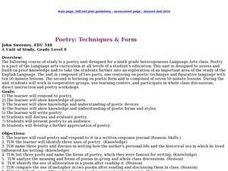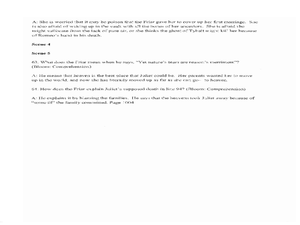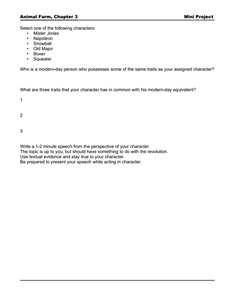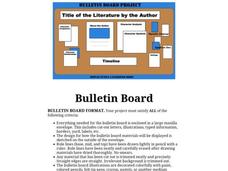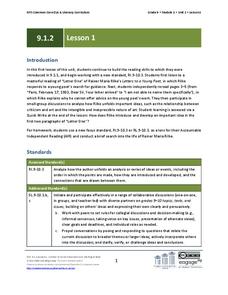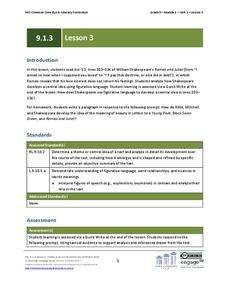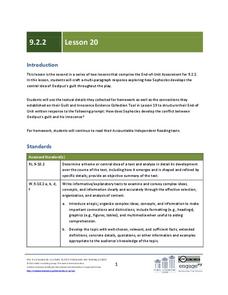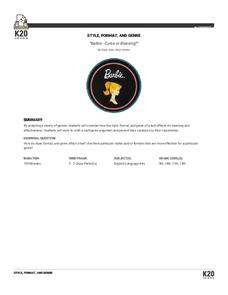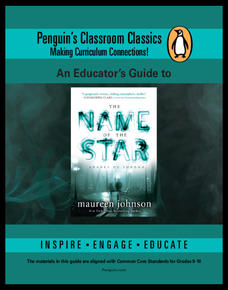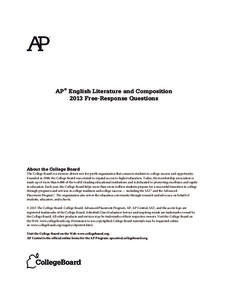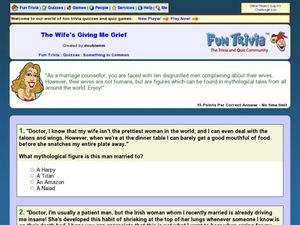Reed Novel Studies
To Kill a Mockingbird: Novel Study
Edgar Rice Burroughs was an American fiction writer whose biggest claim to fame was the creation of Tarzan. Using the novel study for Harper Lee's beloved novel, To Kill a Mockingbird, pupils research and list facts about him or another...
National Endowment for the Humanities
Language Analysis Based on Stave 1
Class members meet the original scrooge, the Dickens character whose name has become synonymous with a cold-hearted, tight-fisted, miser. Using the provided worksheet, readers closely examine context clues to determine the meanings of...
Curated OER
Preparing for Poetry: A Reader's First Steps
Students complete poetry analysis using William Shakespeare's "Sonnet 130" as a part of a study of figurative language. In this Shakespearean language lesson, students define literal and figurative language and practice paraphrasing and...
Curated OER
Rollin’ on the River: Identifying Jargon
Students identify jargon in poetry, prose and fiction. For this literature lesson, students will read selections from Mark Twain and identify figurative langauge, focusing on jargon.
Curated OER
Poetry: Techniques & Form
Ninth graders explore poetic technique and figurative language in this ten lesson unit. Comparisons are made between a variety of forms of poetic expressions and the lives of several poets are studied.
Curated OER
Boys Will Be Boys...Right?
Through this exercise, high schoolers identify character traits present in Romeo and Juliet. They listen to an excerpt from "The Office of Christian Parents: Showing How Children Are to be Governed" and participate in a Socratic...
Curated OER
Analyzing Poetry
Use this poetry analysis worksheet to help your learners understand a poem of their or your choosing. This resource asks class members to summarize the poem and analyze it by looking at voice, word choice, imagery, and theme. The...
Benjamin Franklin Tercentenary
What Ben Read
Just what did Ben Franklin read? By juxtaposing Ben Franklin’s reading material as a young man with an analysis of his developed ideas, learners gain the opportunity to see how the influences of his youthful reading played out. Roman,...
Curated OER
The Enlightenment in Europe: Ch 22
Why study European Enlightenment? Because our governing forefathers and constitution were shaped by their words and philosophies. Presented here are facts and achievements of 8 different figures from the enlightened era. Also included is...
Curated OER
Modernism: American Literature 1914-1945
What characterizes modern literature? The first few slides of this 31-slide PowerPoint discuss what sparked the change to Modernism and discuss some of the key figures of the time (like Karl Marx and Sigmund Freud). The 20s and 30s are...
Curated OER
Animal Farm Chapter 3 Discussion Notes and Mini-Project
Created for a 10th grade English classroom studying George Orwell's Animal Farm, this mini-project promotes exploration of character and plot. In the first section, young readers are required to characterize one character from the story,...
Sandra Effinger
Bulletin Board Project
Imagine a project that informs and entertains. Replace book reports with a bulletin board that highlights all the important elements of a novel. Readers research the author, create a timeline of events in the story, write a character...
College of New Rochelle
Latin Worksheet: Horace, Ode 1.5
Take a look at Horace's "Ode 1.5" from Carmina in depth with an analysis worksheet. Included on the first page is the original Latin version of the verses as well as a literal translation. Pupils respond to questions relating to sounds,...
Curated OER
Those Wacky Greek and Roman Gods: A Quick Cheat-Sheet
Here's a handy two-page reference that briefly identifies major Greek and Roman mythological figures.
EngageNY
Grade 9 ELA Module 1, Unit 2, Lesson 1
Where does a writer find inspiration? "Go into yourself," says Rainer Maria Rilke in "Letter One" from Letters to a Young Poet. Readers of Rilke's letter to Franz Xaver Kappus examine the words and figurative language Rilke uses to...
EngageNY
Grade 9 ELA Module 1: Unit 3, Lesson 3
Class members listen to a masterful reading of Act 1, Scene 1, lines 203-236 of Romeo and Juliet and then break into groups to examine how Shakespeare uses figurative language to develop Romeo's idealized concept of beauty.
EngageNY
Grade 9 ELA Module 1: Unit 3, Lesson 5
Class members continue their study of Romeo and Juliet by watching scenes from Baz Luhrmann’s Romeo + Juliet and then examining the figurative language Shakespeare uses in Act 1, scene 5, lines 92–109 when Romeo and Juliet meet at the ball.
EngageNY
Grade 9 ELA Module 2, Unit 2, Lesson 20
Oedipus' lack of literal and figurative vision does not mean he cannot see his guilt in the terrible fates of Laius, Jocasta, and all the lives touched by prophecy. Conclude a literary analysis unit on Sophocles' Oedipus the King with a...
California Education Partners
Gettysburg Address
Looking for an assessment that reveals how well readers understand complex text? Check out an assessment module based on "The Gettysburg Address." Pupils are asked to craft an essay that demonstrates their understanding not only of the...
University of Oklahoma
Barbie™: Blessing or Curse? - Style, Format, and Genre
New ReviewBarbie has been an iconic figure in the lives of girls since the 1950s, but her existence has been full of controversy. A lesson plan on style, format, and genre explores that controversy by looking at three texts with different...
Penguin Books
An Educator's Guide to The Name of the Star by Maureen Johnson
Jack the Ripper terrorized London in the late 1800s. An educator's guide for the novel The Name of the Star places the historical figure in a modern context. Readers complete a pre-reading activity before answering a series of discussion...
College Board
2013 AP® English Literature and Composition Free-Response Questions
Is there a moment that changed your life? Readers analyze novels and plays to discover the moments in which characters change from children to men. Writers also create essays to analyze literary devices used in The Rainbow and figurative...
EBSCO Industries
Music and Poetry
Song lyrics, like poems, are meant to be heard. After examining the literary devices in several poems, scholars examine the lyrics of popular songs and identify the sound devices and the figurative language writers use to create the...
Curated OER
The Wife's Giving Me Grief
Pretend you are a marriage counselor to the ancients. Based on the problems you are told about, can you guess who the mythological figures are? This creative quiz adds a little fun into identifying characters based on their relationship...
Other popular searches
- Figurative Language
- Figurative Language Poetry
- Figurative Language in Poems
- Figurative Language Quiz
- Figurative Language Project
- Imagery Figurative Language
- Figurative Language Lessons
- Figurative Expressions
- Using Figurative Language
- Figurative Meaning
- Figurative Speech
- Figurative Language Worksheets






